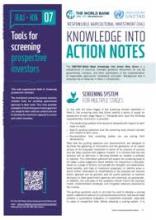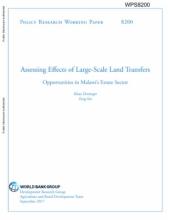Land Library
Bienvenue dans la bibliothèque du Land Portal. Explorez notre vaste collection de ressources en libre accès (plus de 74 000), comprenant des rapports, des articles scientifiques, des articles de recherche, des publications évaluées par des pairs, des documents juridiques, des vidéos et bien plus encore.
/ library resources
Showing items 1 through 9 of 1567.Over the past 30 years, real GDP in Ghana has more than quadrupled, and in 2011 the country joined the ranks of Lower Middle-Income Countries (LMICs).
In May 2019, a complaint was lodged with CAO by members of 22 communities from the Margibi and Bong Counties in Liberia (the “Complainants”), supported by the NGOs Green Advocates International (GAI), Alliance for Rural Democracy (ARD), Natural Resource Women Platform (NRWP), and the Yeagbamah Na
This note is part of an Action Notes series and provides guidance for governments on how to create an investment climate that is conducive to attracting high-quality, responsible investment in agriculture.
This note is part of an Action Notes series and provides examples of tools that government agencies can adapt to their national context and use to develop the technical capacity to screen and select investors.
Land change in Kigali, Rwanda, is examined using Intensity Analysis, which measures the temporal stationarity of changes among categories. Maps for 1981, 2002 and 2014 were produced that show the land categories Built, Vegetated and Other, which is composed mainly of croplands and bare surfaces.
Since the early 1990s, the industrial timber plantation (Hutan Tanaman Industri - HTI) scheme has been intended to serve as a major source of timber to meet domestic and export demand.
This study uses data from the complete computerization of agricultural leases in Malawi, a georeferenced farm survey, and satellite imagery to document the opportunities and challenges of land-based investment in novel ways.
Transit subsidies in the urban area of Buenos Aires are high, amounting to a total of US$5 billion for 2012.
This paper revisits the decades-old puzzle of the inverse plot-size productivity relationship, which states that land productivity decreases as plot size increases.







